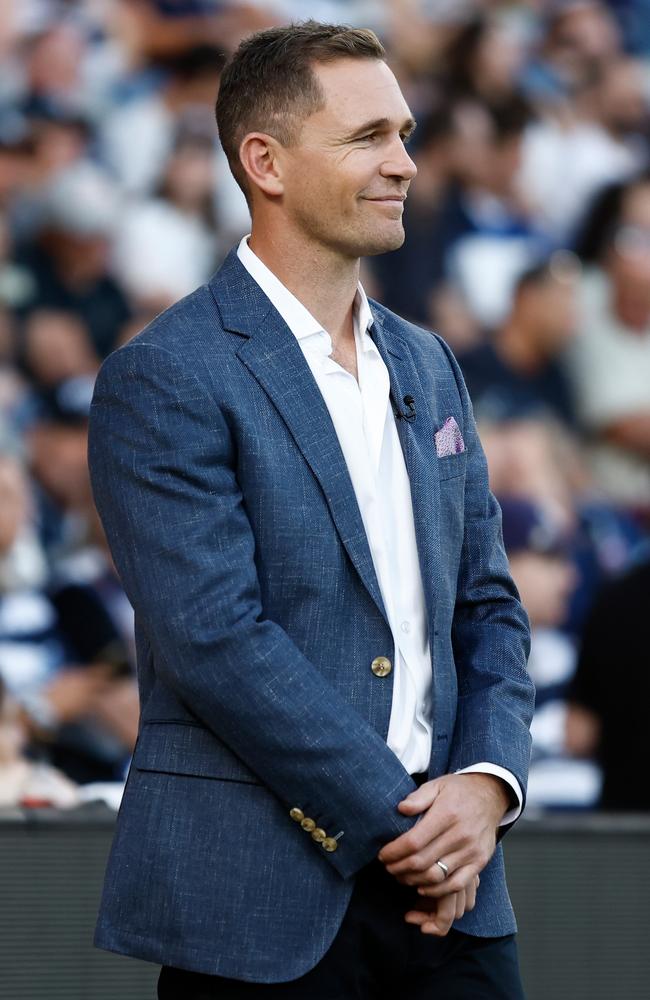The AFL’s head of football Laura Kane speaks about the 27 competitive balance review projects
Laura Kane has taken on a painstaking, Herculean task – to drag all the chaotic and clashing elements of AFL football into one coherent organisation. She tells SAM LANDSBERGER about the likely outcome.
AFL
Don't miss out on the headlines from AFL. Followed categories will be added to My News.
The AFL’s competitive balance review has splintered into 27 projects as the league finalises its look at second-tier football and considers a radical reform of stringent list management rules.
Head of football Laura Kane invited legends Joel Selwood and Erin Phillips to some of the four-hour club visits and will this week update clubs on the timelines for particular workstreams and the scope of the monstrous project.
Kane trawled through roughly 440 pages of written submissions from the 18 clubs (AFL and AFLW), AFL Players’ Association, VFL, SANFL and WAFL earlier this year.
“We wanted to know about everything, from quite specific list rules to the philosophy behind programs to in what order should we do things, and we clearly have two national competitions across men and women,” the rising star of AFL House told the Herald Sun on Saturday.
“For instance, should AFLW wait for some particular mechanisms in men’s to change or adjust before adopting them into that competition?”

Innovative feedback from clubs could pave the way for players to join AFL lists fluidly throughout the year.
“We didn’t just have feedback that questioned how players would move, but it was also when and how many phases through the year should they be able to move or could they be able to move?” Kane said.
“Do we need finite periods or not?”
Clubs have been told which rules are immediately malleable with change “not off the table” for the upcoming trade period and draft in both AFL and AFLW.
That could include a reform of the draft value index, bidding system and providing greater access to Next Generation Academy prospects.
Kane will fly to South Australia in two weeks to finalise aspects of second-tier football amid Port Adelaide and Adelaide’s desperation to exit the SANFL. It will be her third trip to Adelaide this year.
But Kane said the 27 workstreams were so interconnected that it was unlikely one could be isolated and completed. For example, elements of second-tier football are also important to player movement and list rules as part of the talent pathway.
“How do we make sure they’re all talking to each other?” Kane said.
“Jumping to make decisions on one without the other is not something we want to do at the moment. We want to make sure our decisions are holistic.”
However recommendations could be put to the AFL Commission on June 18.
“Some of these projects talk to the really long-term strategic decisions that we might be making in relation to player movement,” she said.
“We know how important list management is in terms of the success of a team on the field, and how important it is to clubs rebuilding and trying to climb up the ladder.
“We clearly have the scheduled Commission meeting (June 18), so they’re always milestones we can keep focusing on.
“Our desire is that everybody has hope and that they can spike back up and we can see different clubs competing in any given year. That is our hope.”

Kane, understudy Josh Mahoney, player movement boss Ned Guy, head of projects Matt Bolitho, consultant Geoff Walsh and coaching engagement manager Dan Richardson recently completed their visit of all 18 clubs where they met 6-8 staff including the senior coach, CEO and football boss across AFL and AFLW.
Kane has held at least 15 additional meetings with club powerbrokers including presidents.
She has also visited the SANFL, WAFL and VFL repeatedly, travelling to WA three times for the assignment.
The lawyer and former North Melbourne administrator phoned frustrated clubs last week to clear the air after they demanded outcomes.
“We’ve moved through an enormous amount of content. Everything is on track, we’re moving through all of the topics really well and we’ve got all of the information we need from clubs,” Kane said.
“We’re not in a rush. The timeline is on track and we have some clear deadlines coming up with Commission meetings and player movement periods.
“But if we’re not ready we won’t make changes. We’ll wait until we are ready.”
About two months ago AFL officials and club football bosses split into groups to unpack and workshop proposed ideas.
This week’s midseason forum catch up will provide clubs with far greater clarity.
Coaches Ken Hinkley (Port Adelaide) and Brad Scott (Essendon) along with GWS Giants football director Jimmy Bartel had led the outrage.
“The pace that things get done from head office is glacial,” Bartel said.
“They’ve got so many staff in there, we’ve got the world’s biggest integrity office as far as sports go, there’s bodies everywhere, but everything goes at a snail’s pace. They don’t work weekends. It’s unbelievable how slow things get done in there.”
More Coverage
Originally published as The AFL’s head of football Laura Kane speaks about the 27 competitive balance review projects








